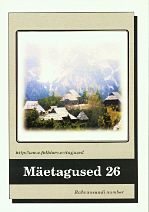Makrokosmos II
Macrocosm II
Author(s): Roomet Jakapi, Enn KasakSubject(s): Philosophy
Published by: Eesti Kirjandusmuuseum
Summary/Abstract: The article is about early modern England in 1650-1750. A characteristic feature of this particular period was combining scientific thought with religious (scriptural) thought, to the extent that the importance of scriptures as sources of truth exceeded science. In this sense, Englishman William Whiston was a typical 17th-18th century thinker: a natural scientist, theologian and philosopher combined. In 1717 he published his "Astronomical Principles of Religion, Natural and Reveal'd". What does he mean by natural and revealed religion? Natural religion is a religion that man can reach through a process of reasoning (independent of divine revelation). If man uses the strength of his or her mind in the right way, he~she will, one way or another, reach the understanding that there is only one omnipotent God, who has created this world. Analogously, man reaches the conclusion that his (nonmaterial) soul is immortal and that there is life after death. The author, however, does not specify what this afterlife is like. W. Whiston's book, starting from its title, combines religious truths with scientific reasoning. Whiston uses scientific arguments to explain the doctrines of natural and revealed religion. In those days it was perfectly normal to believe that sooner or later, in one way or another, life continues after death. Recognising that afterlife does exist poses various intriguing questions about soul and body. For example, if we allow that human soul departs body after death, a question arises - where this soul departs to? Where is the place for departed souls in this universe? This period saw a number of widely different tenets on the issue. Catholics, as expected, still believed that souls departing worldly bodies go to purgatory, for expiation. But in the 17th-18th century England was a dominantly Protestant country. The official position of the Anglican Church was that the concept of purgatory is not biblical, and is therefore relinquished.
Journal: Mäetagused. Hüperajakiri
- Issue Year: 2004
- Issue No: 26
- Page Range: 211-220
- Page Count: 10
- Language: Estonian

